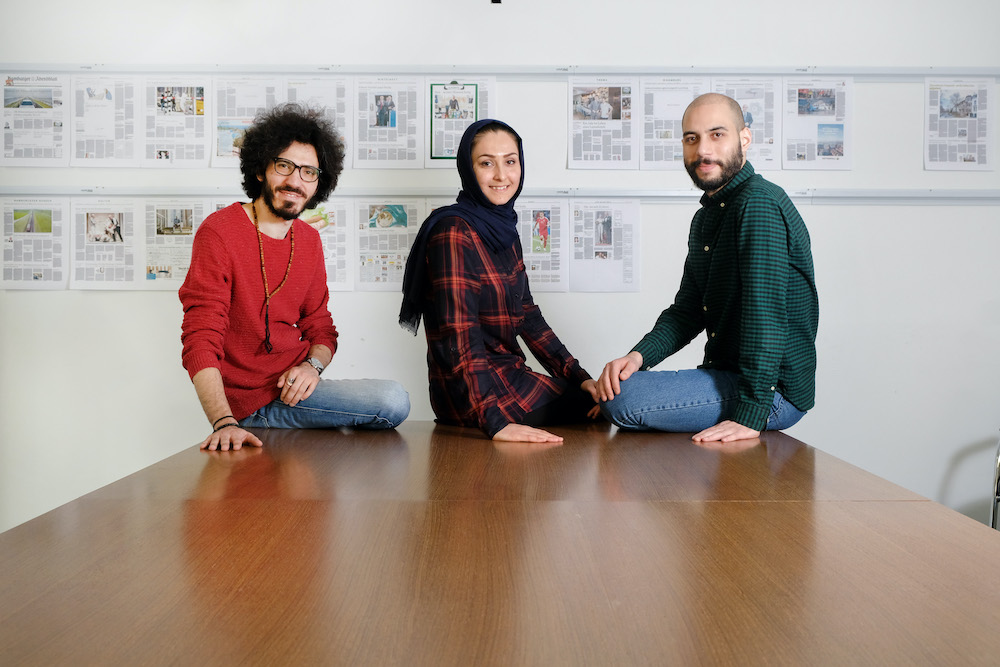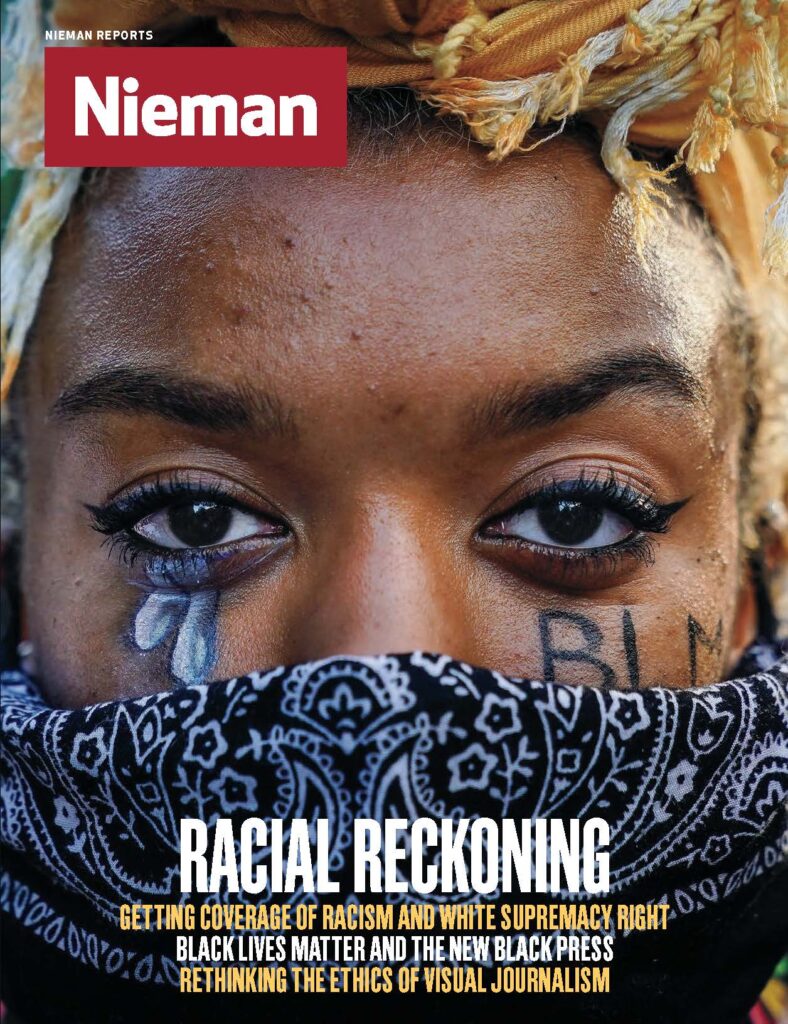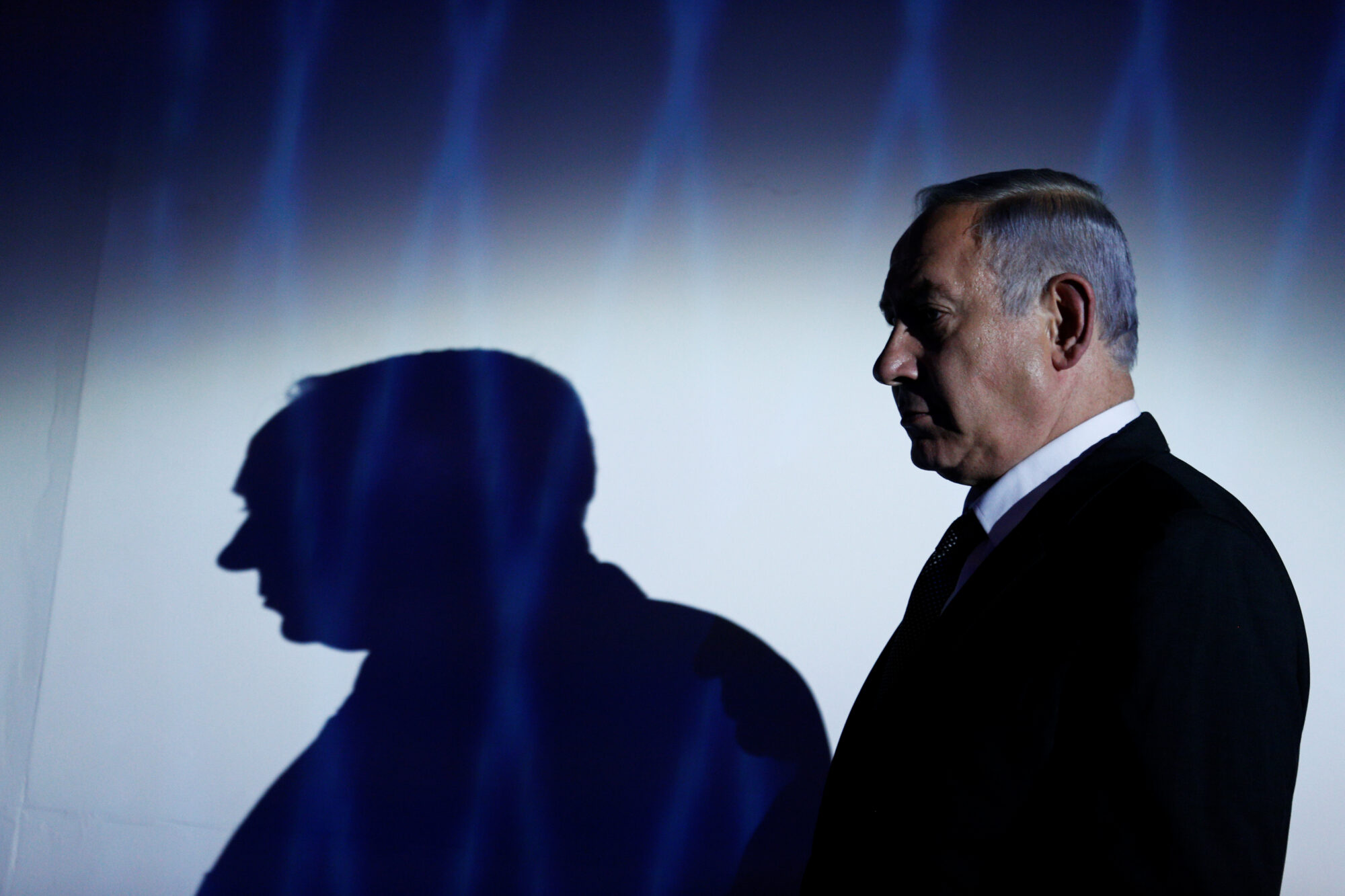It all began with a Facebook post in early 2016. Hussin Satoof, a Syrian refugee living in rural Western Germany, appealed for help finding his nephew Ahmad. The 17-year-old, who came to Germany alone, had disappeared a month earlier from a home for refugee minors in Eastern Germany.
When Tarek Khello spotted the post, he was just getting back to his journalism career two years after arriving in Germany. His work in Syria had grown increasingly dangerous under the autocratic rule of President Bashar al-Assad and the violent repression of protests since 2011. He fled to Lebanon, where the U.N. helped him come to Germany.
Khello spent his first years learning German, not only to make friends and find work, but to satisfy his reporter’s curiosity about the people and places around him. In 2016, Khello trained with the nonprofit Neue Deutsche Medienmacher*innen, a network of “new Germans” working in the media that promotes diversity in journalism. At around the same time, Khello joined Mediendienst Ost, a collective of independent journalists in east Germany founded by German journalist Christian Werner.
Khello and Werner joined forces to look for the missing teenager. It didn’t take them very long to find Ahmad. He had run away from the shelter, which was on the other side of the country from where his uncle lived. At the time, rules governing the regional distribution of asylum seekers did not prioritize keeping them close to family members. He wasn’t missing at all — police picked him up the same day — but staying in another shelter near the first one. Ahmad’s name was misspelled so he was registered as a new case rather than as being found.
At the time, German police estimated that nearly 5,000 refugee children had gone missing. This figure caused widespread alarm. Khello and Werner’s TV and radio reports about their search for Ahmad revealed two crucial explanations: the bureaucratic errors in recording and identifying missing children and runaways caused by Germany’s system of allocating refugee housing without considering family ties. (By the end of 2016, Werner says, the system had improved.)
Refugee journalists can help media outlets develop new ideas, access hard-to-reach sources, speak to new audiences, and enrich coverage
“It was the first time I realized that there were lots of problems that need coverage in the German media, but my German colleagues had never heard of them before,” Khello says. “For German journalists, migrants are heroes or terrorists,” adds Werner. “Migrant journalists open our eyes to the everyday life of migrants and their struggles.”
Their reporting partnership works because of Khello’s skills gaining trust with sources and finding exclusive angles. Meanwhile Werner, who has worked as a journalist in Germany for over 20 years, helps shape their stories for German media editors and audiences.
They have subsequently won journalism prizes for collaborative investigations, one about human smuggling, the other concerning social media myths about life in Europe that target refugees. In a 2019 freelance investigation for German public television ARD, Khello tracked down Syrians implicated in war crimes in Syria who were now living in Germany.
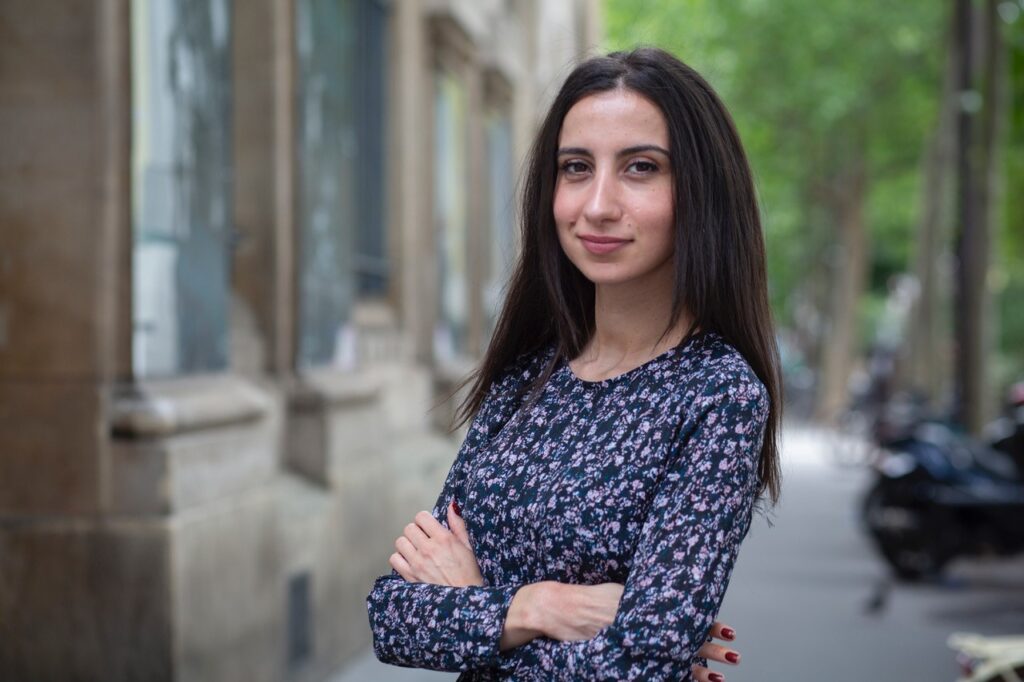
“He was really a gift to us — he opened so many doors for us that we hadn’t had access to before,” says Jorg Wildermuth, commissioning editor for political reporting at MDR, the Leipzig-headquartered affiliate of public broadcaster ARD. “But it’s important that Tarek is not just a translator or facilitating access. He is a very good journalist and he’s doing journalistic work for us.”
Nearly 26 million people around the world are refugees, some of whom are accomplished journalists. At a time when trust in media institutions has declined, and the diversity of media audiences is increasing, these exiled reporters are a crucial source of talent for news organizations. While there are notable success stories of refugee journalists breaking important stories, the hurdles to getting hired for staff jobs are often difficult to overcome.
Refugee journalists can help media outlets develop new ideas, access hard-to-reach sources, speak to new audiences, and enrich coverage. There are numerous beats for which international knowledge and personal experience of migration or exile could be an advantage: from the international desk to local news, immigration, corruption, crime, and social issues. The work of refugee journalists is particularly essential at a time when the impact of migration has revealed critical failures in European institutions — including journalism institutions — and a time when a reckoning over diversity is roiling U.S. newsrooms, too, in the wake of the killing of George Floyd by a white police officer.
In Europe, which saw the arrival of one million people fleeing war and destitution in 2015, refugee journalists, frequently working in tandem with native-born journalists, are breaking stories that might otherwise have been missed. Nonprofits have sprung up to help train exiled reporters, publish their work, and foster relationships with native-speaking journalists and mainstream media outlets.
In France, for example, French-language site Guiti News pairs French and refugee journalists to work together although it doesn’t yet have funds to pay for stories. About half of its refugee journalists have come through the Paris-based Maison des Journalistes (MdJ), which offers a safe place to stay, language support, newsroom internships, and professional networking. Since 2002, MdJ has supported over 400 journalists from 70 countries. Yet many of the alumni still struggle to re-launch their careers: around 80% are not working in journalism today.
In London, the Refugee Journalism Project (RJP) offers training, mentorship, networking and traineeships to displaced journalists. Since it started in 2016, RJP — based at the London College of Communication, part of University of Arts London — has worked with 63 refugee journalists and recently recruited a third cohort of 21. “It’s a two-way relationship,” says RJP director Vivienne Francis. “It’s not so much what big media organizations can offer our participants, it’s what our participants can give them.”
Nonprofits aiding refugee journalists challenge media outlets to rethink how they approach refugee journalists: not as an act of benevolence, but as an act of survival
Such partnerships bring complementary skills and perspectives to the reporting process, but exiled journalists cautioned against entrenching power differentials between refugee and native-speaking journalists, whereby the former takes on the role of a fixer or translator and the latter makes the editorial decisions.
“The problem is that the unique selling point of being an ‘exiled journalist’ is also a label that tends to stick to you forever: When do you stop being a refugee journalist or a journalist with a migrant background, and are simply regarded as a journalist like everyone else?” asks Rebecca Roth, project manager at Neue Deutsche Medienmacher*innen.
This also plays out in newsrooms; many exiled reporters describe being treated as a charity project, pigeonholed as a refugee writer, or feeling like the token minority. This condescending approach to diversity may sound familiar to journalists from other minority communities. It is also ineffective.
Media in Europe has a serious diversity problem. In Germany, for example, around 25% of the population are first- or second-generation immigrants while only an estimated 2 to 5% of journalists are immigrants or come from immigrant families. In the U.K., just 0.2% of journalists are black compared to 3% of the population, and 0.4% are Muslim compared to 4.8% of the population.
“Diversity is not about political correctness, it’s about the quality of media,” says German journalist Tabea Grzeszyk, a co-author of “Unbias the News” and co-founder of collaborative platform Hostwriter. “If anything is going to change, it’s the business case [for diversity] that will change things, as the moral case is not working at all.”
In a 2019 study by the Reuters Institute for the Study of Journalism and Johannes Gutenberg University on diversity in European media, news editors in the U.K., Germany, and Sweden said they want to recruit more journalists with migrant and refugee backgrounds, but they get few such applicants with the requisite language skills.
“If journalism is to shine a light on and explain all facets of society, it has to be pursued from different perspectives. … Diverse candidates might feel discouraged not only by a sense of not belonging but by dwindling opportunities in the industry” the study authors warn. “Achieving diversity demands a commitment to structural change in addition to investment, outreach, and encouragement.”
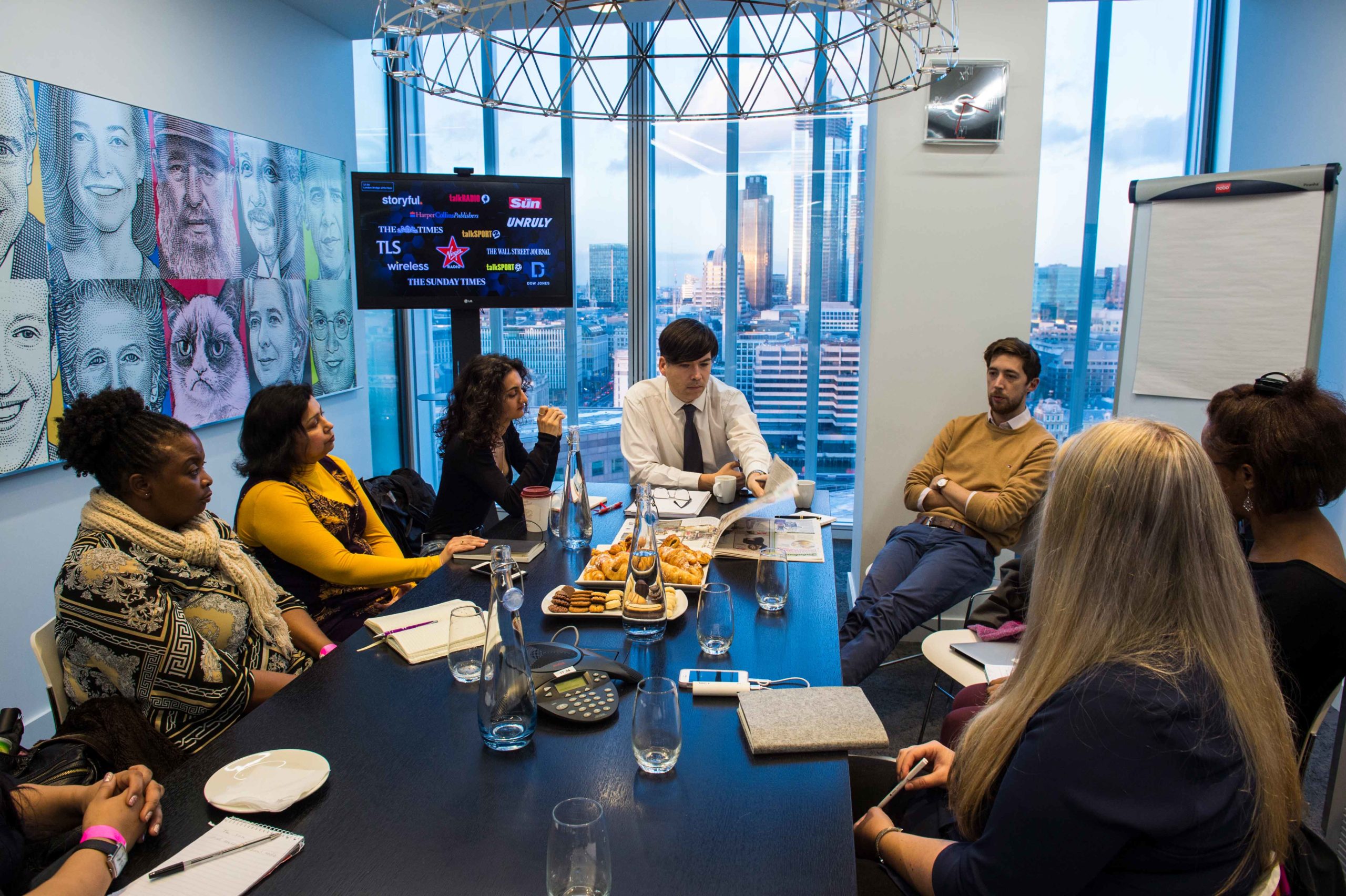
The stakes are particularly high when it comes to migration coverage in Europe. A recent study by the European Journalism Observatory found only 10 percent of U.S. and European stories about migration reviewed gave a voice to migrants or refugees. In France, analysis by Guiti News found that refugees were mentioned in headlines 35,000 times between 2015 and 2018, but only 10% of these articles used refugees as a source of information.
Guiti News was founded in 2018. A catalyst was the frustration French journalist Nina Gheddar shared with her co-founder, a fellow journalist from Afghanistan, about the lack of nuance in migration coverage in France and scarce opportunities for exiled reporters. (Guiti means “the world and the surrounding universe” in Persian.) “The media don’t give names, ages, or professions to migrants. They are just a big group of people you don’t know anything about,” Gheddar says. “Of course, that’s scary.”
Guiti has limited audience reach — mainly people who are already interested in migration issues — and funds; it is hoping to start paying its journalists this year. But its reporters talk of gaining a professional community and a sense of purpose.
“It took me a while to refer to myself as a refugee,” says Sara Farid, a photographer and news producer who fled Pakistan with her family in 2018 after her husband, Taha Siddiqui, also a journalist, narrowly escaped a kidnapping attempt. “I’ve been working for years in Pakistan covering refugee issues, I never thought I’d become one,” she says. “Guiti helped me to accept it and own it. I thought, ‘Fine, I am a refugee but I can help them find these stories. I know so many subjects and people in similar situations to me.’”
For example, Farid produced a podcast for Guiti last year with French reporter Sofia Fischer about Muslim women’s first experiences of wearing a bathing suit. In Pakistan, Farid strongly opposed forcing women to cover their heads, but once she arrived in France she found she equally opposed the the so-called burkini bans, the prohibition on Muslim women covering up on the beach.
“My friends from Yemen, Syria, and Afghanistan, we never wore swimsuits — we don’t even know how to swim — but we loved the sea. I just can’t can’t step into the sea wearing that thing, I’m too shy!” Farid says. “The story was about what it’s like to overcome your inhibitions.” It was a far cry from most French coverage of such issues, says Gheddar, in which white male “experts” opine on how women dress. “Guiti was a platform for me to continue my journalism, not just doing assignments, but to be in an editorial team, taking control of how migration is reported,” Farid says.
The project faces a tension between broadening its audience and diluting its work. Concerned about editorial independence, the team turned down a content-sharing agreement with a large French media organization. “We felt that we were being used for ‘refugee-washing’ - changing appearances without making substantive changes, like investing in the diversity of their own staff,” Gheddar says.
“The French media sector is hard to get into in general, even for French journalists … and the media are very hesitant about hiring foreign journalists,” says Darline Cothière, director of Maison des Journalistes, the Paris-based nonprofit aiding refugee journalists. Even French-speaking refugee reporters face difficulties breaking into the journalism elite, and well-established journalists can be challenged by the versatility of skills — from editing video to doing page layouts — French media outlets demand.
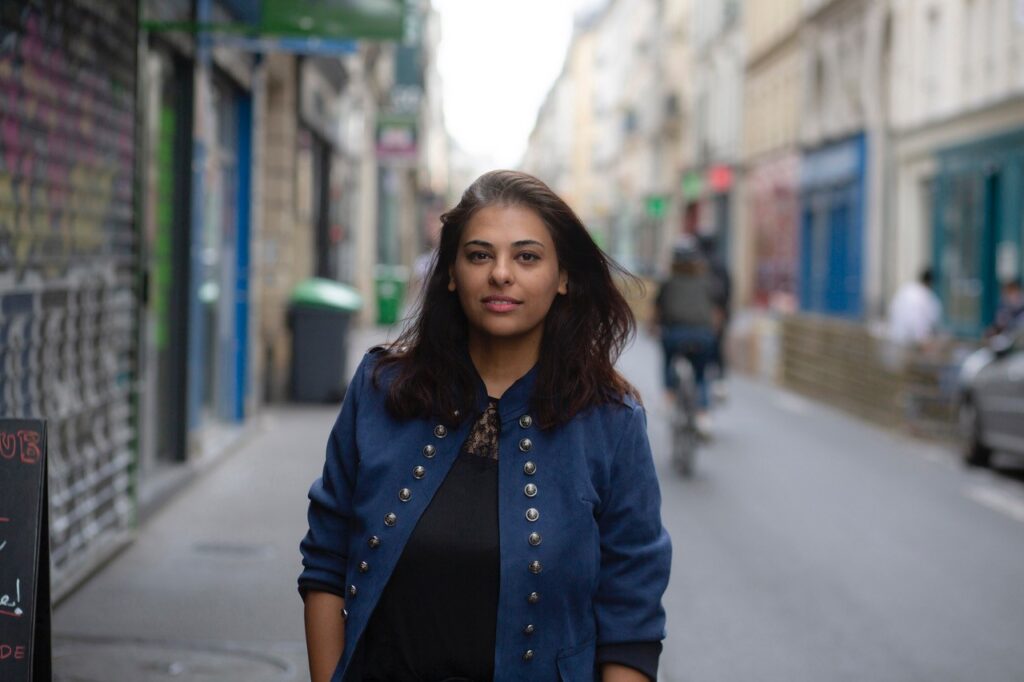
Large international newsrooms like France 24 tend to be more open to employing refugee journalists, according to Cothière, while photo and TV journalists sometimes find it easier to transfer their skills, like Syrian photojournalists Abdulmonam Eassa and Mohammed Badra, MdJ affiliates who both won major photography awards last year.
Francis, director of the London-based RJP, said one of the challenges is getting media outlets to see exiled journalists as more than people to be interviewed during Refugee Week or World Press Freedom Day, but colleagues who should be paid for their work and can report on a range of subjects. Short-term internships or unpaid projects are also not a sustainable option for many journalists. “Most of our participants are in their late 20s or 30s and they have families to look after and bills to pay,” Francis says. “It’s important that we create paid opportunities. Ultimately we need to be creating careers.”
After arriving in the U.K. in 2013, Syrian journalist Abdulwahab Tahhan worked as a cleaner and at Starbucks before discovering the RJP program. He applied for dozens of jobs before he was hired as a researcher by Airwars — a nonprofit founded by journalists to track civilian casualties of war — following a voluntary position organized by RJP. He was Airwars’ first full-time staff member, and it quickly became clear that his local knowledge, rapport with local sources, and huge personal investment in the work would be invaluable to the fledgling nonprofit.
Even Arabic speakers from outside Syria struggle with some of the Syrian slang; it’s hard to geolocate an airstrike if you don’t understand the local word for police station. These regional dialects do not appear in dictionaries or Google Translate. Sources in Syria can also be reluctant to speak, understandably nervous about outside agendas as their country is wrenched apart by competing interests.
“I’m from Aleppo, I was protesting against Assad, I know what they’ve been through,” says Tahhan. “We talk about these things, and it builds rapport.” That’s how he explains the exclusive access he got to rescue workers recovering mass graves in Raqqa after the retreat of ISIS, and documents proving casualties caused by both Kurdish and Turkish militias during the battle for the northern Syrian town of Afrin. “Several of our core team today are also refugees — itself a mark of the long-term, positive impact which [Tahhan] has had on Airwars as an organization,” says Airwars founder Chris Woods.
Tahhan left Airwars last year. He is now a part-time lecturer and is working on a podcast telling stories about the integration of refugees in Turkey and Europe. He’d like to see refugees in every major newsroom in the U.K. “The media is missing out on higher quality coverage because they’re following a recipe for failure,” he says. “You want to do better reporting? Hire people from the people you are reporting on.”
In Europe, refugee journalists are breaking stories that might otherwise have been missed
When Omid Rezaee first arrived in Germany in late 2014, he hated not being able to follow local news. While waiting at bus stops and in supermarket lines, the Iranian journalist was desperate to know what stories people were talking about.
In Iran, Rezaee had been the editor of a student magazine that was banned because it supported the anti-government protests, known as the Green Movement. He was jailed in 2011 and fled to Iraq before getting a humanitarian visa to Germany. Rezaee took part in a training and internship program for exiled journalists at the Hamburg Media School. “They made it possible for me to know how the system works,” he says, “and what I have to offer to the German media landscape.”
In 2017, Rezaee joined a group of exiled journalists from Iran, Afghanistan, and Syria who had recently founded Amal, Berlin!, a news site about the city in Farsi and Arabic. Funded in part by Germany’s Körber Foundation, Amal, Berlin! filled a crucial gap in the local news market for thousands of Arabic and Farsi speakers. Last year they launched Amal, Hamburg! and Rezaee became editor of the site.
The main goal of Amal was to keep newly arrived Arabic and Farsi speakers informed about what’s happening in their cities, but the organizers soon realized that German friends and colleagues were interested in their stories, too. They set up a German page summarizing their reporting and sent a newsletter to German newsrooms. Their reports are now often translated by German outlets.
The four-person Amal, Hamburg! team is based in the newsroom of local newspaper Hamburger Abendblatt, and attends their editorial meetings. It’s been a mutually beneficial relationship. “They make it possible for us to access news and photos really fast,” Rezaee says. “And we offer them access to a migrant community they have no idea about.”
This year, ahead of International Women’s Day, Afghan Amal journalist Nilab Langar wrote a feature in Hamburger Abendblatt about Afghan women in Germany breaking taboos around divorce to leave abusive marriages. “We have a lot of interest [from readers] in issues like this [and] Amal can talk to people who wouldn’t talk to us, who wouldn’t trust us,” says Hamburger Abendblatt reporter Sven Kummereincke. “The connection to the Arabic and Persian community is difficult for us... and we can help them with connections to politicians, for example.”
In Germany, France, and the U.K., the nonprofits aiding refugee journalists challenge media outlets to rethink how they approach refugee journalists: not as an act of benevolence, but as an act of survival — bringing them competitive edge and new audiences. They argue that editors need to be strategic and realize that some upfront investment in hiring and commissioning exiled reporters – who may need some additional mentoring to develop their confidence and skills — can reap greater rewards in the long term.
Even though Amal, Hamburg editor! Rezaee has been writing for German media for over two years, he still doesn’t dare apply for a staff role, fearing that he might slow German newsroom colleagues down. “You need courage,” Rezaee says, “and media organizations need to be a bit braver, too, to say, ‘OK, we need an editor to work a bit longer on this article, but at the end, we’ll have information and access we wouldn’t have otherwise had.’”
